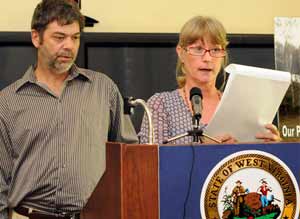|
This article originally provided by The Charleston Gazette August 22, 2011 Citizens call for Marcellus drilling regulation
CHARLESTON, W.Va. -- On the same day that state environmental officials put forth an emergency rule to regulate Marcellus Shale gas drillers, advocates said more is needed. "We want the Legislature to do its job and give West Virginians the protection they deserve. Our health, our homes and our well-being should come first," Carol Warren of the Ohio Valley Environmental Coalition said at a Monday afternoon event outside the state Capitol. Supporters of drilling for natural gas from Marcellus Shale reserves -- among the largest gas reserves in the world -- say it promises to create thousands of well-paying new jobs in West Virginia. Critics believe drillers have already begun to damage the state's water supplies, largely by using hydraulic fracturing, or "fracking," to open up huge fissures in rocks often a mile or more below the surface. They said the millions of gallons of water, laden with possibly harmful chemicals, used in fracking threatens our future water supplies and health. "Drilling being conducted in this and other states is causing harm to people's health and to their livestock and property and to their well water and streams and contaminating the air they breathe," said Leslee McCarty of the West Virginia Environmental Council. "We need to look at the inaction of the Legislature, especially on the Senate side. We need to hold this Legislature accountable," McCarty said. The emergency rule filed Monday was ordered last month by state Senate President Earl Ray Tomblin, who is acting as governor. The rule is meant to provide some regulatory oversight while lawmakers try to craft permanent and more wide-ranging rules for Marcellus Shale drilling, after they failed to do so earlier this year. Among other concerns, activists at Monday's event in Charleston and a similar one in Morgantown say that Monday's rule doesn't address light or noise pollution from well sites, spacing between wells and homes or the rights of surface owners. Tammy Hagy and her husband Dennis raised two sons in their home on 90 acres of rural land along a hollow near Romance in Jackson County. Today, the Hagys live in a mobile home 45 miles away, in Palestine in Wirt County. "We lived there for 22 years," Dennis Hagy said. "Now we can't live there ... we were nauseated, had headaches and my wife was throwing up." After their sons moved away from home, they continued taking water from the wells on their family's farm to drink in their new homes. Then one day in October 2008, their son Clark "said he was spitting up blood. Clark told me he couldn't drink our well water anymore," Tammy Hagy told the press conference. "Clark's doctor treated him for acid reflux disease, which he's never had before in his life. The problem went away after he quit drinking our water." That conversation was a revelation, Tammy said. "All of us had been drinking this water for 10 months. We started talking about changes in our health. Every one of us had a cyst on our body. My husband and I had been very weak and tired all summer. That was not normal for us." After asking for a water test, the Hagys were told to stop drinking the water, but that they could continue to bathe in it. "Two months later, I developed a rash. My dermatologist told me it was contact dermatitis and told me, 'Do not bathe or wash my clothes in our water.'... We started seeing a black substance in our commode, hot water heater and dishwasher. We were getting headaches and feeling very sick," Tammy said. In January 2009, the Hagys moved into a motel room, about 25 minutes away, for two months. When the gas drilling company stopped paying for the motel, they moved into their camper. A month later, they found the rental trailer where they have lived ever since. "We still don't know anything about what is going to happen," Tammy Hagy said. "I hope no one else has to go through such an ordeal." Gary Zuckett, executive director of the West Virginia Citizen Action Group, asked, "What other regulated industry gets to have veto power over its inspectors? "Right now, the Oil and Gas Inspectors Examining Board, which is basically controlled by representatives from the oil and gas industry, interviews and chooses the candidates DEP is allowed to hire." Today, that five-member board has two representatives appointed by oil and gas executives, two from state regulatory agencies and one "citizen representative." The citizen seat, which must be filled by a gubernatorial appointment, has been vacant for five years. The Associated Press contributed to this report. Reach Paul J. Nyden at pjny...@wvgazette.com or 304-348-5164.
|
|
|
West Virginia Surface Owners' Rights Organization |
